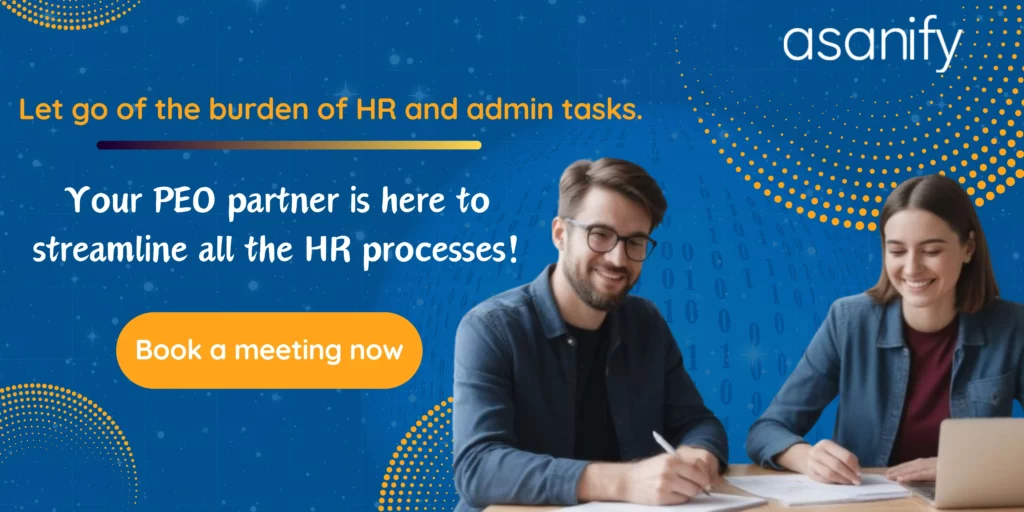Within the modern, changing workforce, companies are constantly in quest of innovative solutions for managing their hiring processes. One such revolutionary solution applied to this area is called the Employer of Record or EOR. This article will let you know exactly what this EOR is, what advantages it offers, and how it may make employment management smoother for those companies that seek to expand their workforce without the hassle of traditional hiring methods. From a startup to an enterprise, understanding just exactly what is an Employer of Record (EOR) can help you with is how one might help find their footing in today’s employment environment.
Table of Contents
- What is an Employer of Record?
- Why Use an EOR?
- Detailed Functions of an EOR
- How Does an EOR Differ from a Staffing Agency?
- When to Use an EOR vs Setting Up a Local Entity
- EOR, PEO, GEO: Understanding the Differences
- Defining PEO
- What is a Global PEO
- How To Select an Employer of Record (EOR) Partner
- Why Asanify as YOUR Reliable Partner in India
- Conclusion
- FAQs
What is an Employer of Record (EOR)?
Businesses would very much love to expand their businesses outside of their own countries, but entering a new market and dealing with local labor laws, payroll, and compliance can be very tough. It is where the concept of an Employer of Record (EOR) really shines: An EOR is a third-party organization that hires people legally for a company, thereby easing international hiring.
For companies that want to enter foreign markets, EOR services provide an easy solution. They let businesses hire workers without needing to create a local company, making it faster to enter the market and lowering risk. This blog post will look at the EOR model, its benefits, and how it can help businesses succeed in new markets.
Why Use an EOR?
- Expansion into another country presents various challenges. One big concern is adherence to the law because labor laws and tax rules differ in different countries. Non-adherence to such may lead to fines or even legal issues.
- An EOR streamlines many HR tasks. For example, it would take care of payroll, including taxes and benefits, in accordance with local laws. It takes care of all aspects of an employee’s time with a company, from the beginning to the end.
- An EOR helps the business speed up its hiring process. With their processes in place and local knowledge, EORs can aid in finding and onboarding talent very quickly. They will also easily adapt to changes in local law or market conditions, so your business can be very flexible.
- Engaging an EOR significantly reduces the administrative load on your organization. An EOR manages compliance and legal obligations, freeing your team to focus on growth and innovation. Furthermore, outsourcing these responsibilities can save on operational costs, reducing the need to maintain a local entity.
Suggested Read: What is an Employer of Record (EOR)? The Ultimate Guide

Detailed Functions of an EOR
An EOR serves multiple purposes that benefit your business. Here are the detailed functions that an EOR performs to significantly enhance your business management:
Payroll Management
The primary role an Employer of Record will play is to handle the payroll function for workers in another country. That’s ensuring that workers are paid correctly and on time according to what they agreed to earn. EORs also deal with pay variations such as overtime, bonuses, and other forms of pay modification
Handling of Taxes and Benefits
EORs are responsible for taxes and benefits of the employees. They calculate and pay the right amount of income tax and social security withheld from paychecks. EORs also submit required tax forms to local authorities to ensure compliance with rules. They also manage employee benefits such as health insurance, retirement plans, and paid time off, ensuring these benefits are compliant with local legislation.
Compliance with Local Labor Laws
Understanding labor laws is quite complex, and to keep things in line, having EORs on the board is important. They create and update employment contracts according to the rules followed in that area and monitor labor standards related to working hours, minimum wage, and work safety.
Visa and Work Permit Arrangements
EORs assist in immigration processes for foreign workers. This includes sourcing their work visas and permits and ensuring they comply with all the related immigration laws. EORs prepare and forward the required documents to government officials regarding visa applications as well as assist with renewals or job status changes that may necessitate visa changes.
Interface with Government Authorities
EORs act as go-between entities for businesses and local governments. They ensure that labor and tax reports and documents are received on time, thus making it easier for the business to be in compliance. As a legal link, EORs handle questions from government agencies or audits and provide information on the pertinent local laws, changes in the labor rules, and other important policies of the government.
How does an EOR differ from a staffing agency?
An EOR is fundamentally different from a staffing agency. An EOR assumes all of an employer’s liability, payroll, benefits, compliance, and taxes while allowing that company to hire employees without having to set up the actual legal entity of the business in that location. It is ideal for companies expanding into new markets and for those with remote teams.
In contrast, an EOR is primarily responsible for identifying and placing employees into either short-term or permanent work. An EOR might manage payroll for their placements but does not serve as the employer of record. Staffing agencies are most commonly used when filling short-term job openings or a specific skill gap. EORs are best for solutions that work to create long-term employment and robust human resource support.
When to Use an EOR vs. Setting Up a Local Entity
Cost is one of the major deciding factors when the choice has to be made between an EOR and a local company. Setting up a local business is hugely expensive for small teams. Adding all of the legal fees, compliance costs, payroll systems, and the costs of running some kind of admin on a daily basis quickly adds up. An EOR, on the other hand, would normally be cheaper and permit businesses to hire people from other countries without any serious up-front costs.
EORs are very helpful in many situations. A major benefit of EOR is quick market entry; when businesses want to enter a new market fast, an EOR can help them hire and follow the rules without the delays that come with setting up a legal business. Also, if a company is looking into a new market and is not sure about committing for a long time, using an EOR lets them try it out without spending too much money.
EOR, PEO, and GEO: Understanding the Differences
| Aspect | EOR (Employer of Record) | PEO (Professional Employment Organisation) | GEO (Global Employment Organisation) |
| Definition | A third-party organization that legally employs staff on behalf of another company. | A service that provides comprehensive HR services, including payroll, benefits, and compliance, while co-employing employees. | A special kind of PEO specializing in the provision of employment solutions for international operation companies. |
| Employment Relationship | Employees report directly to the EOR. | Employees work for both the PEO and the client. | Employees work for the GEO, just like they do for EOR. |
| Primary Services | Payroll management, compliance, benefits, and tax handling. | Comprehensive HR services, including employee benefits, risk management, and compliance. | Job solutions designed for international businesses, including following local labor laws and handling payroll. |
Defining PEO
A PEO is an outsourced HR provider that delivers comprehensive HR services to small and medium-sized businesses. In a co-employment relationship with a PEO, the employer responsibilities of the business are assumed by the PEO-for example, payroll processing, benefits administration, regulatory compliance, and risk management. The benefits for the business in partnering with a PEO include streamlined HR functions, reduced administrative burdens, and more effective benefits and resources contributing to improved employee satisfaction and retention.
What is a Global PEO
The Global PEO is a generalization of the PEO model into an international environment whereby companies can hire employees from other countries without necessarily setting up local entities. A Global PEO takes control of every aspect of employment, including compliance with labor laws in specific regions, as well as services such as payroll and employee benefits; hence, it enables companies to quickly and effectively expand to new markets. This service can be very effective for business houses looking to tap into talent pools all around the world or test new markets with all sorts of minimal complexities attached to international employment regulations.
How to Select an Employer of Record (EOR) Partner
- Professional Expertise: One would do well to check up on their skills when picking an Employer of Record. Find a partner who understands local labor laws, tax rules, and compliance needs in the countries you are considering. A good EOR has to prove a history of effective management of payroll, benefits, and employee relations on behalf of the business-a sure way of keeping your business compliant and away from possible legal issues.
- Transparent Service Pricing: Clear service pricing is a major factor. A great EOR should be able to present simple pricing details that clearly show all fees for their services, including any setup costs, monthly management fees, and extra charges for special services.
- Customized Service: Every business has varying needs, so a good EOR partner must be capable of offering services according to what you need. There must be flexibility in payroll options, and a choice of benefits offered, and help for different kinds of workers: full-time, part-time, or even contract workers.
- Flexible Contract Terms: Having flexible contract terms is also important for meeting the changing needs of your company. Ensure that you find an EOR who allows adjustable contract lengths and terms in allowing it to grow just like your company develops or changes its plan.
- Experience in Your Business Industry: The more familiar an EOR is with your sector, the better they’ll understand the special challenges and needs that you’ll have. With all this understanding, you can get advice on rules in your specific industry and hiring strategies.
Suggested Read: Employer of Record Services India

Why Asanify as Your Reliable EOR Partner in India?
Asanify is one of the best EORs in India because of its prominent reasons. First, they have a wide expertise in navigating the Indian Labour and compliance environment. Their experience goes toward making sure your business operates within the legal frameworks because their core team is excellent at managing payroll, tax regulation, and employee benefits for international companies, bringing peace of mind to those companies.
Moreover, Asanify is transparent on the pricing. That means you get to know upfront the cost you will incur for their services without any unknown charges towards services. Their service solution is tailored to your needs, and they do have flexible options regarding payroll and benefits packages.
Conclusion
An EOR will enable a business to find a strategic solution for managing foreign market hiring, payroll, and compliance while entering new territories quickly and easily without any inconvenience of establishing a local entity. The hassle of recruiting and on-boarding applicants can be easily done with the help of an EOR.
It is significant for companies to understand the distinction between EORs, PEOs, and GEOs so as to make decisions based on individual requirements and situations. A few of the important considerations in selecting an EOR partner are cost, flexibility, and industry specialization.
FAQs
An EOR hires employees legally to another company, covering payroll, benefits, compliance, and HR issues.
An EOR directly hires employees, while a PEO co-hires along with the client, sharing risks with the client.
An EOR is useful for swift entry into a new market, experimentation in an area, or when a company does not have internal compliance knowledge.
Although an EOR would save the initial investment in a local entity, the expense will vary because of services and the number of employees.
Choose an EOR with depth expert knowledge on local laws, and keep communication flowing to be updated on new compliance updates and changes.
EORs mainly handle the full-time employees, however some include independent contractors in the services they provide.
Consider the following: geographical reach, compliance expertise, technology, support, and pricing while choosing the correct EOR for your organisation.
Options are to set up a local entity, via an agency or with a PEO.
EORs can be found for most countries, namely, the US, UK, Canada, Australia, and many in Europe and Asia.
No, hiring via an EOR is typically faster and easier to complete than to establish a local entity.
To simplify hiring in new markets, avoid risks associated with compliance, and streamline HR functions.
Advantages include guaranteed compliance, reduced administrative burden, faster market entry, and access to global talent.
The EOR is the employer so they take care of payrolls and compliance. In the meantime, the customer controls the day-to-day work.
The primary benefit is to hire globally without requiring a local entity.
An EOR service provides work on areas such as payroll processing, tax compliance, benefits management, and also onboarding.
Costs vary and in many cases, they are a fee per employee or percentage of payroll.
Not to be considered as tax, legal, financial or HR advice. Regulations change over time so please consult a lawyer, accountant or Labour Law expert for specific guidance.



